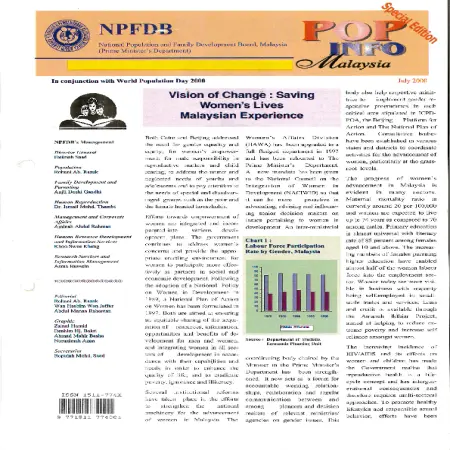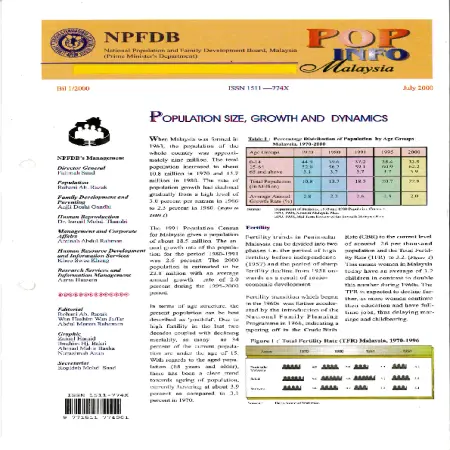Browse by Year
Results for Year : "2000"
|
|
Family development module for Institutions of Higher Education
Item Type: Module
Editor:
Year: 01/12/2000
Abstract: The NPFDB has initiated a family development programme (MOPKITP) for students from Institutions of Higher Education. The Family Development Module will be offered through the co-curriculum programme. This Family Development Module Package is a combination of the NPFDB's existing modules, that is Permata Kasih, Youth Exploration, SMARTbelanja, SMARTSTART, Bahtera Kasih, Belaian Kasih, Mutiara Kasih and POP Community. The outcome of this collaborative effort with the Institutions of Higher Education will be a pool of student who are "trained facilitators". Hence the NPFDB will be able to use these students to further expand its family development programmes to the grassroots.
|
|
|
|
|
|
Kajian kesan pendatang asing ke atas penduduk tempatan: 'satu tinjauan di Mukim Setapak dan Ulu Kelang'
Item Type: Research Report
Editor:
Year: 01/12/2000
Abstract: This study was conducted to gather information on the impact of immigrants on the local aspect of demographic, economic, social, education, employment, health and safety. By using qualitative methods, fieldwork has successfully interviewed include locals, foreigners, government officials and community leaders. The study found that over 70 percent of respondents say that the locals immigrants chose Malaysia because of the economic opportunities and family ties with the local people. In addition, a stable political situation is also a cause of withdrawal immigrants into Malaysia. Almost half of the immigrants use the health facilities provided by the government. This causes the local population to resort to private clinics / hospitals that indirectly increase the cost of family expenses.
|
|
|
|
|
|
Vision of change: saving women's lives Malaysian experience
Item Type: Newsletter
Editor:
Year: 00/07/2000
Abstract: Efforts towards empowerment of women are integrated and incorporated into various development plans. The progress of women’s advancement in Malaysia is evident in many sectors. Maternal mortality ratio is currently around 20 per 100,000 and women are expected to live up to 74 years as compared to 70 among males. Primary education is almost universal with literacy rate of 85 per cent among females aged 10 and above. The increasing numbers of females pursuing higher education have enabled almost half of the women labour force into the employment sector. Women today are more visible in business with majority being self-employed in small scale trades and services.
|
|
|
|
|
|
Population size, growth and dynamics
Item Type: Newsletter
Editor:
Year: 00/07/2000
Abstract: When Malaysia was formed in 1963, the population of the whole country was approximately 9 million. The total population increased to about 10.8 million in 1970 and 13.7 million in 1980. The rate of population growth had declined gradually from a high level of 3.0 per cent per annum in 1966 to 2.3 per cent in 1980. Besides, with the continuing decline in fertility, relatively low level of mortality and inflow of international migrants being controlled, the population of Malaysia will continue to increase at a slower rate in the future.
|
|
|
|
|
|
KASIH Package module
Item Type: Module
Editor:
Year: 00/00/2000
Abstract: The KASIH package consists of five key modules based on the family life cycle which is Module On Preparation For Marriage - (Bahtera Kasih) - Focuses on enhancing knowledge and skills on marriage preparation and developing a strong foundation for marriages, Module On Fatherhood - (Pancaran Kasih) - Focuses on sharpening the parenting skills of fathers in shaping their children's development, Module On Parenting of Young Children - (Belaian Kasih) - Equips parents with techniques and skills for parenting their young children, Module On Parenting Adolescents - (Mutiara Kasih) - Assists parents to develop effective communication and relationship skills in guiding their adolescent children to be resilient in facing challenges and Module On Adolescent Development - (Permata Kasih) - Adolescent are guided to develop positive values such as being caring and sensitive, loving, responsible and having good personalities in line with the family, society and country's aspiration.
|
|
|
|
|
|
I'm in Control module (Teenagers)
Item Type: Module
Editor:
Year: 00/00/2000
Abstract: The main objective of the I'm in Control module is to empower teenagers with the appropriate knowledge, attitudes and skills to make informed choices about their sexual and reproductive health. This module is targeted at teenagers aged 13 - 17 years and focuses on building skills to prevent and reduce the risks to pregnancy, sexually transmitted infections and HIV/AIDS. Skills provided include identifying and avoiding high risk situations and using assertive techniques to avoid premarital sex.
|
|
|
|
|
|
I'm In Control module (Parent's Edition)
Item Type: Module
Editor:
Year: 00/00/2000
Abstract: The I'm In Control module (Parent's Edition) has been developed to complement the I'm In Control Module developed for teenagers. The module objectives are to enhance parent's knowledge on the physiological, biological, physical and social development of adolescents, to increase parenting knowledge and skills on adolescent sexual and reproductive health and to provide skills on enhancing parent-teen relationship.
|
|
|
|







